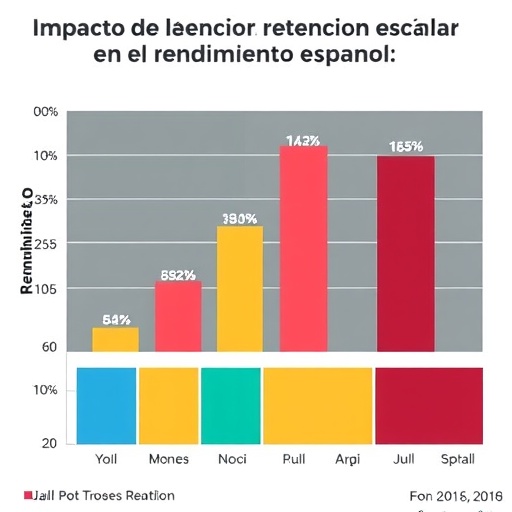In an era where educational performance metrics are increasingly scrutinized, recent research by León and Martínez-Abad sheds significant light on the complex dynamics of grade retention and academic achievement among Spanish students. Their study, utilizing a robust propensity score matching approach, aims to unravel the nuanced effects of retaining students within the educational system, a topic that has garnered considerable debate among educators and policymakers alike.
The concept of grade retention refers to the practice of having students repeat a specific grade level due to insufficient academic progress. While this approach is often implemented with the assumption that additional time in the same grade will bolster a student’s academic skills, the actual outcomes of such a strategy are far from straightforward. The implications of grade retention extend beyond academic performance; they also touch on psychosocial factors, future educational pathways, and long-term life outcomes.
León and Martínez-Abad’s study critically examines these implications by analyzing data from a significant cohort of Spanish students. The researchers employed a propensity score matching technique to control for a variety of influencing factors. This method allows them to effectively compare outcomes between retained students and their peers who were promoted, ensuring that the comparison is as fair and unbiased as possible. By isolating the impact of grade retention from other confounding variables, the researchers provide a clearer picture of its true effects.
Importantly, the findings reveal that while some retained students may initially see an improvement in their academic performance, the long-term benefits of grade retention appear to diminish over time. Many students who are retained struggle to maintain their academic gains, raising questions about the efficacy of this educational intervention. The transient nature of these improvements suggests that merely repeating a grade may not address the underlying issues affecting student performance.
Furthermore, the study highlights the varied outcomes based on demographic and socio-economic factors. For instance, students from disadvantaged backgrounds exhibit different responses to grade retention compared to their more affluent counterparts. This disparity raises crucial considerations for equitable education practices and the long-term ramifications of retaining students who may already be facing significant challenges in their educational journey.
Another critical aspect of the research is its focus on the psychological ramifications of grade retention. Students who are held back often experience a decline in self-esteem and motivation, factors that can significantly impact their overall educational experience. The emotional toll associated with being retained may lead to disengagement from the learning process, potentially contributing to increased dropout rates. These psychological effects can create a cyclical pattern of academic struggle, further complicating the retention issue.
In contrast, the researchers also point out that advancement to the next grade is not a panacea. Students who are promoted without adequate preparation may also struggle, leading to their own set of challenges in subsequent years. This finding underscores the necessity of providing comprehensive support systems for all students, regardless of whether they are retained or promoted.
The implications of the study extend beyond Spain, resonating with educational systems worldwide. As countries grapple with how to effectively promote student success, the findings of León and Martínez-Abad serve as a crucial reminder of the importance of individualized learning strategies. Rather than relying on blanket policies of retention or promotion, educators are encouraged to adopt more tailored approaches that consider the unique needs of each student.
Moreover, collaboration between educators, parents, and policymakers is essential to create a supportive educational environment where students can thrive. This collaboration must focus on addressing not only academic challenges but also emotional and social factors that influence student performance and well-being. By fostering a holistic approach to education, it may be possible to mitigate the adverse effects of grade retention and enhance overall student success.
In conclusion, León and Martínez-Abad’s research presents compelling evidence that questions the traditional reliance on grade retention as a strategy for improving academic performance. Their findings emphasize the need for a comprehensive evaluation of educational policies, urging stakeholders to consider the diverse factors that influence student achievement. The study advocates for an evolution in the approach to education, prioritizing strategies that are grounded in evidence, compassion, and an understanding of the complexities of student learning.
As educators, parents, and policymakers reflect on the implications of this study, it becomes clear that the future of education must be informed by research and a commitment to fostering an inclusive and effective learning environment. Addressing the challenges faced by students, rather than resorting to retention, may ultimately be the key to unlocking their full potential and ensuring sustainable academic success.
Understanding the multifaceted nature of educational achievement is crucial as we move forward. The conversations initiated by León and Martínez-Abad’s study are vital, paving the way for more nuanced discussions around student learning, support systems, and the lasting impact of educational practices. As the world continues to evolve, so too must our approaches to educating the next generation.
With ongoing research in educational psychology and pedagogy, the future of effective teaching strategies looks promising. The desire to improve educational outcomes for all students remains a collective goal, one that requires continued inquiry, collaboration, and a commitment to evidence-based practices.
In our increasingly interconnected world, it is essential to share knowledge and insights across borders. The lessons from León and Martínez-Abad’s study are particularly pertinent as various education systems confront similar challenges. By fostering dialogue and understanding, we can collectively work towards a more effective and equitable educational landscape that prioritizes the academic and emotional well-being of students.
Subject of Research: The effect of grade retention on performance in Spanish students.
Article Title: The effect of grade retention on performance in Spanish students: a propensity score matching approach.
Article References:
León, J., Martínez-Abad, F. The effect of grade retention on performance in Spanish students: a propensity score matching approach.
Large-scale Assess Educ 13, 8 (2025). https://doi.org/10.1186/s40536-025-00243-0
Image Credits: AI Generated
DOI: 10.1186/s40536-025-00243-0
Keywords: Grade retention, educational performance, student achievement, educational policy, educational psychology.




